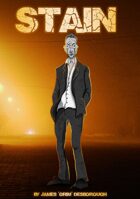From: MundayNext@gmail.com
To: ReisenChew@urlang.ac.uk
Hey Jane,
It was good to meet you the other day. Despite the sad circumstances. Thank you for letting me in. I’ve filled the skip with things I think are junk and set aside a few other odds and ends I don’t want but which may interest you or at least be able to be auctioned off.
I must say, I’m shocked at the state of the place, the house is a real tip and looks like it has barely been maintained. My hat is off to you for being willing to work in such circumstances and I’m, frankly, shocked that he had the money to pay you but not to replace the broken window in the downstairs toilet.
As for his notes and other materials I am slowly sifting through them to see if there’s anything worth keeping, but he was clearly getting disorganised in his old age and only his draft manuscripts, next to his typewriter (!) seem to be in any sort of order at all, not that they make a great deal of sense to me either. You might be better qualified than I am to know what material would make a suitable legacy or donation to one of the university libraries.
Amongst his notes I found some interesting pieces of art. My uncle was never much for the visual arts and to have so many similar pieces in his possession seems more than a little out of character. They’re not really my ‘thing’ but they clearly meant something to him. Can you shed any light?
I’ve had a copy of the key cut for myself in town, so you won’t need to be around to let me in any more. Still, give me a text if you are going to be about or if you want any help. I’ll be staying at a B&B in town until this is sorted out.
Cheers,
Bill
***
From: ReisenChew@urlang.ac.uk
To: MundayNext@gmail.com
Hi Bill,
Nice to meet you too, I’ll go through what you’ve left when I get a spare morning.
I don’t want you to think too badly of your uncle, he just wasn’t very practically minded and while I did what I could he mostly wanted me there to help with his notes and research rather than as a glorified housekeeper. It’s not like he went senile or anything, or turned into a hoarder, he was as intense and bright as ever as long as I knew him. Scarily so.
He didn’t have to pay me, but he did and thanks for letting me know about the will. He didn’t have a lot but it should keep me from building up too big of a debt, for which I will be forever grateful.
His recent project and manuscript he was being quite secretive about but I think his earlier work on ‘Ur language’ is worth keeping, even if it was never completed. The ideas behind it seem sound to me and it could help whoever studies these things after him to make faster progress. The notes are in the red cardboard files in the bottom drawer of the leftmost cabinet and should be in order.
As to the art, that was somehow related to his recent work I think. Most of it comes from a student on the Fine Arts course, Tony Wilcox. Student admin should be able to put you in touch if you explain what it’s all about. He came by the house a couple of times to drop things off so if I see him around I’ll let him know you’re looking for him.
J
***
From: MundayNext@gmail.com
To: ReisenChew@urlang.ac.uk
Hey J, thanks for the quick reply,
I’ll definitely look into this artist. Maybe he can let me know what’s going on with all that and I can work out whether it’ll be worth anything in the future. 🙂
I found the ‘Ur language’ thing, but despite being a writer I can’t make head nor tail of it. I recognise the words but it all seems a bit technical to me. I’ll save it, but it would be nice to know what it’s about so I can brag at parties.
B
***
From: ReisenChew@urlang.ac.uk
To: MundayNext@gmail.com
Ur language was your uncle’s concept of an original human language, a sort of human ‘root code’ if you will. You can think of it like this, there are basic things that are instinctual about human communication. We know what a blush means, or a smile, no matter what our culture or origin. We know a scream in pain means one thing and a laugh another, a hiss, a glare, all those sorts of things. Sure there’s some local variations and nuances but your uncle believed there was some deeper communication possible at this sort of root level, that concepts other than ‘danger!’ could be expressed.
He didn’t get very far with it, but the ideas seem sound to me.
Gotta run, got a lecture to go to.
Good luck!
J
Read Full Post »










